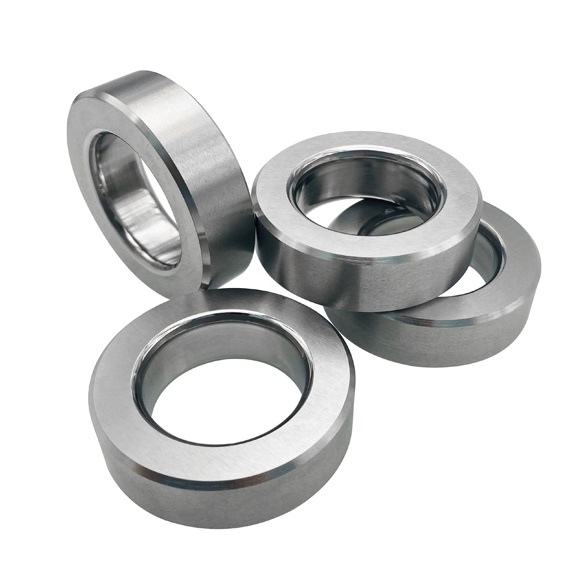Tungsten carbide (W.C) is a very hard, wear-resistant, and corrosion-resistant material composed of tungsten and carbon atoms. Its excellent performance has enabled tungsten carbide alloy to be widely used in multiple industrial fields, including valve manufacturing. Also known as tungsten titanium alloy or tungsten steel, it is mainly used in the valve industry for the valve core and valve seat of ball valves.

1. Characteristics of tungsten carbide alloy: Tungsten carbide alloy has a series of excellent material properties, which make it popular in valve manufacturing. Here are some main characteristics: Hardness: Tungsten carbide alloy is an extremely hard material, harder than most metal materials. Its hardness can reach HRA90 or above, allowing it to withstand high pressure, high temperature, and wear in valves. Wear resistance: Tungsten carbide alloy has excellent wear resistance, making it an ideal choice for manufacturing worn parts in valves. It can maintain a flat and smooth surface during long-term use.
Corrosion resistance: Tungsten carbide alloy has high corrosion resistance to many corrosive media. This makes it suitable for valves in the chemical, petroleum, and other fields, where fluids may be corrosive. High temperature stability: Tungsten carbide alloy remains stable in high temperature environments and is not easily deformed or melted. This is crucial for valve applications in high-temperature fluid control. Low friction coefficient: The low friction coefficient of tungsten carbide alloy reduces friction losses during valve operation and improves operational efficiency.
2. Application of tungsten carbide alloy in valves: Tungsten carbide alloy is widely used in valve manufacturing, especially in applications that require high strength, wear resistance, and corrosion resistance. The following are some typical valve components, among which tungsten carbide alloy is commonly used: valve seat and ball: tungsten carbide alloy is commonly used to manufacture valve seats and balls. These components need to withstand pressure and wear under high pressure and high temperature conditions, so the hardness and wear resistance of tungsten carbide alloy make it an ideal material. Seals: The application of tungsten carbide alloy in valve seals can provide excellent sealing performance, especially under high temperature and high pressure conditions. Its low friction coefficient helps reduce operating force and improve sealing reliability, commonly found in ball valves. Valve suspension and operating components: Tungsten carbide alloy can be used for valve suspension and operating components, such as valve stem, valve stem sleeve, and other key components. This helps to extend the service life of these components and reduce the need for maintenance and replacement. Valve seat ring: The hardness and wear resistance of tungsten carbide alloy make it an ideal material for manufacturing valve seat rings. The seat ring needs to withstand high-frequency pressure and wear during valve operation, and the material properties of tungsten carbide alloy make it highly durable. 3. Typical application areas: Tungsten carbide alloy is widely used in valve manufacturing, suitable for multiple industrial fields, including but not limited to the following areas: - Petroleum and natural gas industry: Tungsten carbide alloy is commonly used to manufacture oil and gas switch valves, control valves, and shut-off valves under high pressure and high temperature conditions- Chemical industry: Tungsten carbide alloy is widely used in valve components that require resistance to corrosive chemicals and high temperatures in chemical processes- Electric power industry: valves used in boilers, power plants, and nuclear power plants under high temperature and high pressure conditions- Food and pharmaceutical industry: The corrosion resistance and wear resistance of tungsten carbide alloy make it the preferred choice for sanitary valves in the food and pharmaceutical industry- Mining and metallurgical industry: High pressure and wear-resistant valves used in ore and metal processing- Water treatment industry: used in sewage treatment and water supply systems, where valves need to withstand corrosive water quality and high temperatures. Conclusion: The excellent properties of tungsten carbide alloy make it an important material in the field of valve manufacturing. Its hardness, wear resistance